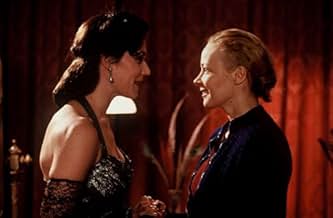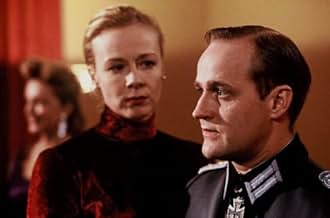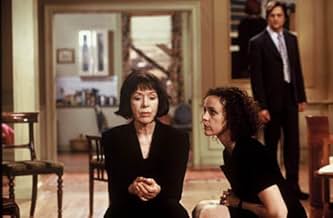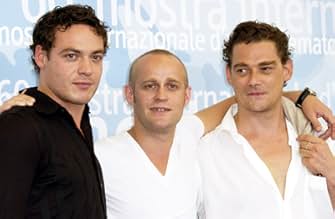IMDb RATING
6.7/10
2.6K
YOUR RATING
After the death of her father, Hannah becomes concerned with the strange behavior of her mother. As her mother's troubled childhood is revealed, Hannah realizes how little she ever knew.After the death of her father, Hannah becomes concerned with the strange behavior of her mother. As her mother's troubled childhood is revealed, Hannah realizes how little she ever knew.After the death of her father, Hannah becomes concerned with the strange behavior of her mother. As her mother's troubled childhood is revealed, Hannah realizes how little she ever knew.
- Director
- Writers
- Stars
- Awards
- 9 wins & 3 nominations total
- Director
- Writers
- All cast & crew
- Production, box office & more at IMDbPro
Featured reviews
Goebbels motivation in backing down was not explored. In the aftermath of Stalingrad the Reich had decided to go for 'total war'. This is referred to in the film. Part of this was to use women in the war effort, which Germany had not previously done to any great extent. An SS massacre of women would have faced Goebbels with a public relations disaster of massive proportion. His preference was to make the problem go away as quietly as possible, on the basis that the Jewish men could always be rounded up later. I understand the majority survived the war.
His other problem was that the 'Red' Berlin had never been very enthusiastically behind the Nazi cause and had to be handled cautiously. Again a massacre of women could have cost the Nazis what mediocre level of support they had in their capital city.
It was interesting that the majority of SS uniforms showed patches which indicated that the men wearing them were not of German nationality, but were from German origins in other countries such as Lithuania or Latvia
His other problem was that the 'Red' Berlin had never been very enthusiastically behind the Nazi cause and had to be handled cautiously. Again a massacre of women could have cost the Nazis what mediocre level of support they had in their capital city.
It was interesting that the majority of SS uniforms showed patches which indicated that the men wearing them were not of German nationality, but were from German origins in other countries such as Lithuania or Latvia
Rosenstrasse is more an intimate film than one of epic proportions, which could have kept away many film goers looking for a Pianist similar plot. Fortunately, Von Trotta, a good screenwriter, opts for a feminist peep to an era too much illustrated on its colorful exterior, but too little analyzed in terms of intimacy and from the point of view of ordinary Aryan German rather from a Jewish standpoint. Rosentrasse finds its strength in these unsung burdens of people trapped within historical circumstances of which they emerge as victims. The pace of the film is introspective, poignantly slow, meditative. Besides, the characters are so vivid while transitions between generations and the passing of time has been deftly crafted. Rosenstrasse is not a masterpiece, and some narrative flaws are well discerned. Another fault lies on a trivial cinematography unable to capture the intensity of the internal drama lived by the characters. Nevertheless, this film is worth seeing. Finally, Rosenstrasse is part of the last trend in German films dealing with the ghosts of a nightmarish past,trend that includes such excellent films as Nowhere in Africa, and recently, the controversial Downfall. I would recommend this film to those who know how to read beyond the images.
I'm always surprised about how many times you'll see something about World War 2 on the German national television. You would think they don't like to open old wounds, but there isn't a week that goes by without a documentary or a movie about the horror and atrocities of this war. Perhaps it's a way of dealing with their past, I don't know, but you sure can't blame them of ignoring what happened. And it has to be said: most of those documentaries are really worth a watch because they never try to gloss over the truth and the same can be said about their movies (think for instance about "Der Untergang" or "The Downfall" as you might now it) which are also very realistic.
One of those movies is "Rosenstrasse". It tells a true story and deals with the subject of the mixed marriages during the war, even though the movie starts with a family in the USA, at the present day. After Hannah's father died, her mother all a sudden turned into an orthodox Jew even though she hasn't been very religious before. She doesn't know where the strange behavior of her mother comes from, but as she starts digging in her mother's troubled childhood, Hannah understands how little she has ever known about her mother's past.
The fact that this movie deals with the subject of the mixed marriages during the Nazi regime is already quite surprising. For as far as I know, there hasn't been another movie that deals with this subject. (For those who didn't know this yet: Being married to a so-called pure Aryian man or woman meant for many Jews that they weren't immediately sent to one of the concentration camps, but that they had to work in a factory). But it does not only tell something about the problems of the mixed marriages, it also gives a good idea of how these people were often seen by their own parents and relatives. How difficult it sometimes was for them during the Nazi regime and how these people, most of the time women, did everything within their power to free their men, once they were captured and locked away in for instance the Rosenstrasse...
The acting is really good and the story is very well written, although the way it was presented in the beginning didn't really do it for me (and that's exactly the only part that you'll get to see in the trailer). Perhaps it's just me, but I would have left out a big part of what happens in the present day. At least of the part that is situated in the USA, because the part where Hannah goes to Berlin and talks to someone who knows more about her mother's past, definitely works.
If you are interested in everything that has something to do with the Second World War, and if you aren't necessarily looking for a lot of action shots, than this is definitely a movie you should see. This isn't a movie in which you'll see any battles or gunfights, but it certainly is an interesting movie, because it gives you an idea about an aspect of the war only little is known of. I give it an 8/10.
One of those movies is "Rosenstrasse". It tells a true story and deals with the subject of the mixed marriages during the war, even though the movie starts with a family in the USA, at the present day. After Hannah's father died, her mother all a sudden turned into an orthodox Jew even though she hasn't been very religious before. She doesn't know where the strange behavior of her mother comes from, but as she starts digging in her mother's troubled childhood, Hannah understands how little she has ever known about her mother's past.
The fact that this movie deals with the subject of the mixed marriages during the Nazi regime is already quite surprising. For as far as I know, there hasn't been another movie that deals with this subject. (For those who didn't know this yet: Being married to a so-called pure Aryian man or woman meant for many Jews that they weren't immediately sent to one of the concentration camps, but that they had to work in a factory). But it does not only tell something about the problems of the mixed marriages, it also gives a good idea of how these people were often seen by their own parents and relatives. How difficult it sometimes was for them during the Nazi regime and how these people, most of the time women, did everything within their power to free their men, once they were captured and locked away in for instance the Rosenstrasse...
The acting is really good and the story is very well written, although the way it was presented in the beginning didn't really do it for me (and that's exactly the only part that you'll get to see in the trailer). Perhaps it's just me, but I would have left out a big part of what happens in the present day. At least of the part that is situated in the USA, because the part where Hannah goes to Berlin and talks to someone who knows more about her mother's past, definitely works.
If you are interested in everything that has something to do with the Second World War, and if you aren't necessarily looking for a lot of action shots, than this is definitely a movie you should see. This isn't a movie in which you'll see any battles or gunfights, but it certainly is an interesting movie, because it gives you an idea about an aspect of the war only little is known of. I give it an 8/10.
I went to see the movie for two reasons: 1) Katha Riemann was given a prize for her role in Venice and 2) The story - the rescue of hundreds of Berlin jews, who had been rounded up for deportation in the spring of 1943 - and were being kept by the Gestapo in Rosenstrasse (Rose Street) - is important. The deportation was halted by the non-jewish partners and friends who demonstrated in front of the detainment centre.
However, Trottas movie is extremely disappointing, a pamphlet put on celluloid. The movie is intended to be GOOD, the main characters are intended to be GOOD, the nazis are just EVIL, lustful or downright stupid. Maria Schrader is supposed to be a young jewish New Yorker, trying to understand the unspoken traumas of her German-born mother who survived Rosenstrasse - but never succeeds in convincing me, that she is American. (There is something about her body-language which is much too Continental). Extremely annoying is the use of German in the US scenes....spiced with a few choice english words or sentences which seem totally out of place.
Katja Riemann does add a bit more life to her character - a Preussian baroness and talented pianist, who rescues her jewish husband. (Does she really have to f*** propaganda minister Goebbels to get hubby away from Gestapo- and does Goebbels really have to be portrayed as a - cartoonish - lustful little salivating man, forever chasing a bit of tail, and so plainly disgusting).
We all know Goebbels was a war criminal - but it would have been so more interesting, if the characters were REAL people and the story not just a study in black and white with a stilted dialogue.
However, Trottas movie is extremely disappointing, a pamphlet put on celluloid. The movie is intended to be GOOD, the main characters are intended to be GOOD, the nazis are just EVIL, lustful or downright stupid. Maria Schrader is supposed to be a young jewish New Yorker, trying to understand the unspoken traumas of her German-born mother who survived Rosenstrasse - but never succeeds in convincing me, that she is American. (There is something about her body-language which is much too Continental). Extremely annoying is the use of German in the US scenes....spiced with a few choice english words or sentences which seem totally out of place.
Katja Riemann does add a bit more life to her character - a Preussian baroness and talented pianist, who rescues her jewish husband. (Does she really have to f*** propaganda minister Goebbels to get hubby away from Gestapo- and does Goebbels really have to be portrayed as a - cartoonish - lustful little salivating man, forever chasing a bit of tail, and so plainly disgusting).
We all know Goebbels was a war criminal - but it would have been so more interesting, if the characters were REAL people and the story not just a study in black and white with a stilted dialogue.
"Rosenstrasse" is a defense of naive Righteous Gentiles, the women who married secular Jews in Germany as the Nazis rose to power.
Like "The Pianist," it goes out of its way to distinguish between Nazis and natives who thought this too shall pass and noble Prussian culture would again assert itself (I couldn't pick up all the cultural references, particularly in the German music selections, though soldiers are seen dancing to Cole Porter songs.).
While the promotion for the film claims that feminist director Margarethe von Trotta is the first to deal with this particular slice of German protest to the Nazi eradication of Jews, a series of German films not otherwise distributed in the U.S. were shown on PBS some years ago and demonstrated that other post-war filmmakers were looking at complicity and professed ignorance among their country people, and that their discovery of their parents' hypocrisy led to the radical politics of 1968.
Von Trotta carefully avoids this context by oddly having her seeker of truth be a young American woman who grew up speaking German fluently in the German Jewish emigre enclave of Washington Heights in Manhattan (from whence came Henry Kissinger) and has a South American boyfriend.
Somewhat clumsily for the narrative and for the family, her father's death leads her to investigate her mother's past in Germany to try and figure out why her cold, secular mother is suddenly following shiva (Jewish mourning rituals) for him. (These rituals are disconcertingly portrayed inaccurately -- What rule of silence? Everyone would be talking about memories of the deceased, and eating and eating-- unless the point is to show they don't know how to follow Jewish tradition anymore and talk of any past is verboten in this family).
The film unravels, not particularly satisfactorily, many layers of irony and guilt as personal and political realities are intertwined --
between Germans (especially soldiers who had witnessed what the S.S. was doing in the East, showing it was not a secret at home); between gentiles and Jews (particularly about intermarriage then and now); between survivors and the dead; between men and women (there's an assertion that gentile men deserted their Jewish wives to their fates while gentile women did not desert their spouses); between mothers and children, whether biologically linked or not; between siblings, and,between chance and choice.
Katja Riemann's strong performance as the stubborn wife who accidentally becomes an activist by default almost puts aside the fact that her character was monumentally oblivious to what was happening around her until it was almost too late by a thread.
The conclusion seems to come out in favor of compromise as it explores love and tradition, which is inevitably not happy for everyone but may be a flexible response to a complicated past and present.
Like "The Pianist," it goes out of its way to distinguish between Nazis and natives who thought this too shall pass and noble Prussian culture would again assert itself (I couldn't pick up all the cultural references, particularly in the German music selections, though soldiers are seen dancing to Cole Porter songs.).
While the promotion for the film claims that feminist director Margarethe von Trotta is the first to deal with this particular slice of German protest to the Nazi eradication of Jews, a series of German films not otherwise distributed in the U.S. were shown on PBS some years ago and demonstrated that other post-war filmmakers were looking at complicity and professed ignorance among their country people, and that their discovery of their parents' hypocrisy led to the radical politics of 1968.
Von Trotta carefully avoids this context by oddly having her seeker of truth be a young American woman who grew up speaking German fluently in the German Jewish emigre enclave of Washington Heights in Manhattan (from whence came Henry Kissinger) and has a South American boyfriend.
Somewhat clumsily for the narrative and for the family, her father's death leads her to investigate her mother's past in Germany to try and figure out why her cold, secular mother is suddenly following shiva (Jewish mourning rituals) for him. (These rituals are disconcertingly portrayed inaccurately -- What rule of silence? Everyone would be talking about memories of the deceased, and eating and eating-- unless the point is to show they don't know how to follow Jewish tradition anymore and talk of any past is verboten in this family).
The film unravels, not particularly satisfactorily, many layers of irony and guilt as personal and political realities are intertwined --
between Germans (especially soldiers who had witnessed what the S.S. was doing in the East, showing it was not a secret at home); between gentiles and Jews (particularly about intermarriage then and now); between survivors and the dead; between men and women (there's an assertion that gentile men deserted their Jewish wives to their fates while gentile women did not desert their spouses); between mothers and children, whether biologically linked or not; between siblings, and,between chance and choice.
Katja Riemann's strong performance as the stubborn wife who accidentally becomes an activist by default almost puts aside the fact that her character was monumentally oblivious to what was happening around her until it was almost too late by a thread.
The conclusion seems to come out in favor of compromise as it explores love and tradition, which is inevitably not happy for everyone but may be a flexible response to a complicated past and present.
Did you know
- TriviaIt took Margarethe von Trotta almost 10 years to realize this project for financial reasons.
- ConnectionsFeatured in Katja Riemann (2006)
- SoundtracksSonata for Piano and Violin in A
'Allegretto Moderato' - César Franck (op. 446 198 2)
Courtesy of UNIVERSAL CLASSICS & JAZZ - a division of UNIVERSAL MUSIC GmbH
- How long is Rosenstrasse?Powered by Alexa
Details
- Release date
- Countries of origin
- Languages
- Also known as
- Cuộc biểu tình Rosenstrasse
- Filming locations
- Production companies
- See more company credits at IMDbPro
Box office
- Gross US & Canada
- $734,519
- Gross worldwide
- $6,075,609
- Runtime
- 2h 16m(136 min)
- Color
- Sound mix
- Aspect ratio
- 2.35 : 1
Contribute to this page
Suggest an edit or add missing content






































